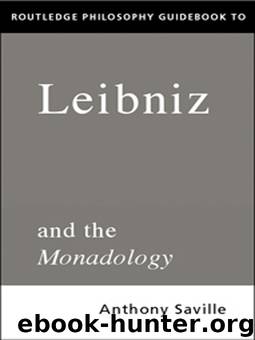Routledge Philosophy Guidebook to Leibniz and the Monadology by Savile Anthony. Leibniz Gottfried Wilhelm

Author:Savile, Anthony.,Leibniz, Gottfried Wilhelm
Language: eng
Format: epub
Publisher: Taylor & Francis Ltd
Published: 2001-03-14T16:00:00+00:00
Putting the two ideas together it becomes apparent that each member of that infinitude of possibilities will consist of a maximal set of compossibles. That notion does not itself single out our world of course, as the Spinoza letter might seem to suggest, but it does characterize any world that God might reasonably elect to create. We need to see why that should be.
Every simple substance is subject to the Law of Excluded Middle. As we saw in Chapter 1, Leibniz regards that logical commitment as integral to the Principle of Contradiction, and he expounds it as the claim that every proposition or its opposite is true. If we consider a proposition about a single monad, e.g. the proposition that Simon is proud, Excluded Middle will allow us to affirm the disjunction: either Simon is proud or Simon is not proud. Since this is an entirely general thought, we can say, for any individual substance at all, and for any properties it might have, either that that substance has the property affirmed of it or that it lacks it. It will follow from this that every substance has what Leibniz calls ‘a complete concept’, meaning thereby that every monad, be it actual or possible, is completely determinate in that one or other of ‘F’ or ‘not-F’ holds true of it for all predicates that could possibly apply to it, or for all properties that it might possess.2
It is Leibniz’s assumption that any complete substance concept could be actualized. That is what came to pass in an infinity of cases when God originally created the monads that he did. He chose to make real a large, in fact infinite, number of possible individuals by producing instances of their complete concepts. Because the concepts instantiated are complete ones, it cannot be that any of them should have had more instances than one, for the very completeness of their concepts ensures that there could be nothing that would distinguish between one instance of such a concept and another. The Identity of Indiscernibles implies directly that only one individual can answer to any monad’s full concept. However, while any single such concept could be actualized, Leibniz holds that only some of them can be jointly actualized. God’s decision to create one set of monads automatically excludes the creation of others. So, in creating one world, God is obliged to leave other worlds uncreated. That, however, does not tell us why, when he decides to create a number of individual substances, he is bound to create all those substances that are compatible with one another or why he could not be content with a subset of such compossibles.
Leibniz is clear in his mind that God could not create several worlds because the very idea is incoherent. For that to be the case the putatively plural worlds’ members would have to be compatible with one another, and if they were that they would all belong to a maximal set of compossibles, and thus all belong to one and the same world.
Download
This site does not store any files on its server. We only index and link to content provided by other sites. Please contact the content providers to delete copyright contents if any and email us, we'll remove relevant links or contents immediately.
The remains of the day by Kazuo Ishiguro(8981)
Tools of Titans by Timothy Ferriss(8369)
Giovanni's Room by James Baldwin(7330)
The Black Swan by Nassim Nicholas Taleb(7111)
Inner Engineering: A Yogi's Guide to Joy by Sadhguru(6785)
The Way of Zen by Alan W. Watts(6601)
Asking the Right Questions: A Guide to Critical Thinking by M. Neil Browne & Stuart M. Keeley(5762)
The Power of Now: A Guide to Spiritual Enlightenment by Eckhart Tolle(5760)
The Six Wives Of Henry VIII (WOMEN IN HISTORY) by Fraser Antonia(5505)
Astrophysics for People in a Hurry by Neil DeGrasse Tyson(5182)
Housekeeping by Marilynne Robinson(4436)
12 Rules for Life by Jordan B. Peterson(4299)
Double Down (Diary of a Wimpy Kid Book 11) by Jeff Kinney(4261)
Ikigai by Héctor García & Francesc Miralles(4247)
The Ethical Slut by Janet W. Hardy(4243)
Skin in the Game by Nassim Nicholas Taleb(4240)
The Art of Happiness by The Dalai Lama(4125)
Skin in the Game: Hidden Asymmetries in Daily Life by Nassim Nicholas Taleb(3993)
Walking by Henry David Thoreau(3953)
